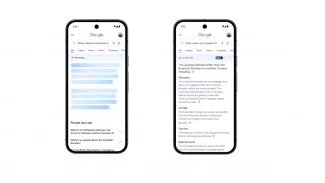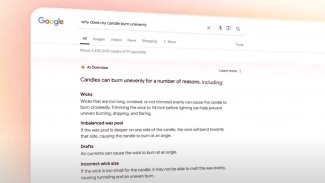Názory k článku
Facebook vás sleduje pomocí 25 % webových stránek a pomocí 61 % populárních aplikací
-
Článek je starý, nové názory již nelze přidávat.
-

Ale moze, par ludi so mnou uz riesilo ze sa nemoze zrazu prihlasit na fb, jedina moznost tam bola oscanovat nejaky doklad (v nasich koncinach op). Sic som im to to neodporucal, ale zaroven viem ze ludska blbost je nekonecna. Takze nutkanie si overit co o mne ten fb nazbieral, bude skor len dodanie dalsieho dielu skladacky.
-

Povedal by som ze k dost profilom budu mat nascanovane doklady. Tam proste funguje vztah dealer - zavislak. K tym ostatnym im mnoho ludi poskytlo svoj adresar (najdite na fb svojich priatelov). Aj ked nemaju konkretny udaj tak je mozne vycislit pravdepodobnost s akou je mozne konkretnu osobu spojit s profilom. A ak sa k tomu prida smirovanie google, tak je to vycislenie pravdepodobnosti este presnejsie.
-
nil nil (neregistrovaný)
Aké vycislenie? Uživatelé zadávají do různých služeb emaily i tel. čísla a facebok k tomu sbírá ještě i digitalní otisky a pak je propojuje s těmi, která vyluxoval z telefonů nebožáků, kterým výrobce předinstaloval aplikaci, nebo to udělali sami. To ale dělá víc společností, ten Google nevyjímaje ...
-

dw: Nechtěl byste si konečně přečíst komentáře, na které reagujete? Nebo nám vážně chcete tvrdit, že lidé, kteří nemají na FB účet, zasílají do FB scany osobních dokladů, aby jim FB obnovil přístup k jejich (neexistujícím) účtům? To totiž z vašich komentářů plyne, když je beru v kontextu této diskuse. Já celou dobu píšu o stínovém profilu, jak se nazývá profil člověka na FB, který tam nemá účet – stínový profil si vytváří FB bez vědomí dotyčného. Když o tom celou dobu píšu, asi o jeho existenci vím, nemyslíte?
-

dw: Jo, soustředit se, to potřebujete. Musíte totiž v hlavě udržet dvě informace na ráz: Za prvé, je tu řeč o stínových profilech, tedy o profilech, které Facebook vytváří automaticky, nejsou přiřazené k uživatelskému účtu. A za druhé, vy píšete o prokazování vlastnictví účtu, které se dělá například zasláním skenu osobního dokladu.
Všimněte si, že první informace je o „účet neexistuje“ a druhá o „účet existuje“. Jeden člověk nemůže zároveň nemít i mít účet na Facebooku. Už to chápete?
-

Přístup k nim má Facebook. To bohatě stačí, může na jejich základě cílit reklamu. Proč by je zpřístupňoval ještě někomu dalšímu?
Mimochodem, původní otázka byla: „Jak se k těm informacím dostanu já, ten, o kom ten profil je?“ Je prima, že jste konečně pochopil to, co jsem napsal hned na začátku – že „vlastník“ profilu se k těm informacím nedostane nijak.
-

Napr, kauza Cambridge Analytica. Tato firma sa okrem data miningu a datovej analyzy zaoberala aj datovym maklerstvom. Facebook sa mozno s toho vyzul stym ze si nasypal na hlavu popol, ze bolo mozne dostat udaje jak z api tak z html kodu, ktory poskytoval fb. Ale tym co sa zaoberaju bezpecnostov a vedia co bolo/je mozne vytazit z facebooku, bude jasne ze udaje ktore mali k dispoziici pochadzaju z miningu minoritne a ze vacsia cast dat isla cez maklerov.
Detaily si dohladajte sam, nie som zodpovedny za vasu edukaciu. A ak o tom chcete diskutovat tak si o tom precitajte nieco viac ako vyhlasenia pre ovce.
-

Ak ma firma udaje uzivatelov ktore nemohla ziskat len miningom a zaobera sa datovym maklerstvom(obchodovanim), tak k tym udajom mohla prist len tak ze ich kupila. Jedno ci priamo od facebooku alebo od prostrednika. Laxne vyhlasenia facebooku, spominanej firmy ani tych ktori na tom mali zaujem, medzeru medzi moznostami miningu a potrebami pre vyuzitie nevyplni. A ak uz existuje, opodstatneny predpoklad, ze k predaju udajov doslo, tak je pravdepodobne ze islo aj o tienove ucty. Ked tak zacat mozete tu https://cs.wikipedia.org/wiki/Cambridge_Analytica preklikate sa k zaujimavym poznatkom, najdete toho vcelku dost, takze vy si radsej robte poznamky. Nie ze by som narazal na vasu pamat, ale aktivne trolenie na roote vas bude zrejme dost rozptylovat.
-

dw: Fajn. takže jsme se od vašeho původního tvrzení, že existují kauzy, kdy Facebook sdílel stínové profily s třetími stranami, dostali k tomu, co vědí všichni – že Facebook předal údaje o uživatelích Facebooku Cambridge Analytica. Takže z několika případů máme jeden, že šlo i o stínové profily je jenom vaše ničím nepodložená domněnka… Necítíte se hloupě, když pořád někoho chcete poučovat, a nakonec se vždy ukáže, že po několika kolech komentářů víte to, co všichni ostatní věděli už na začátku?
-

Ak narazate na to ze neislo o aj tienove profily z titule prezumpcieneviny, tak ta je zvedsa platna u nevinnych subjektov, nie tych ktorym v tej suvislosti bola preukazana vina. Ak je facebook vinny tym ze predal osobne udaje uzivatelov, tak je velmi mala pravdepodobnost ze tienovych profilov sa to netykalo. Kludne si niekde dajte anketu s otazkou "Myslite ze pri predaji osobnych udajov uzivatelov, neboli zahrnute tienove profily". Mozem vam dopredu povedat ako ta anketa dopadne.
-

Toto je forum (co to znamena si najdete sam). Nie je to poradna, ktora predpoklada ze odpovede budu priamo reflektovat otazku. Preto diskutujuci predkladaju nazory k teme (co to znamena si najdete). A potom je tu este trol, ktory celu diskusiu troli svojim rozporovanim vsetkeho z principu a naviac pouziva az neprijemne mnozstvo argumentacnych failov (chcete odkaz na diskusiu, kde som vam tie argumentacne faily jeden za druhym pomenoval?)
-

Alebo sa zaregistrujete na FB ako uplny novacik a pozriete do historie a tam zistite o sebe fotky, kontakty a pod stare niekolko rokov.
PS: Oznacovanie ludi na fotkach zo skoly (tie kde sa foti cela trieda aj s tabulou a rokom) je docela peklo. Tam potom a staci jeden aktivny co poklika tvare a napise mena.
-

Označovať ma na fotkách inými užívateľmi sa dá v nastaveniach FB zakázať. Okrem toho som na mojich fotkách otagoval sám seba "fake" menami. Netuším, či to pomôže ale každý piesok nasypaný do stroja FB algoritmov je bonus (keď som začal striktne označovať každú politickú reklamu na FB ako "Samovražda a sebapoškodzovanie" prestala sa mi zobrazovať).
-

Nevím, jak přímo FB, ale Instagram při zablokování účtu, pokud ho chcete obnovit požaduje tohle, což nevím k čemu jim je, pokud tam dotyčný neměl žádnou fotku...
Abychom vám mohli pomoct, musíte potvrdit, že jste vlastníky tohoto účtu.
K odpovědi na tento e-mail přiložte svou fotku, na které držíte ručně napsaný kód uvedený níže.
52365
Přesvědčte se, že poslaná fotka:
- zobrazuje výše uvedený ručně napsaný kód na čistém listu papíru společně s vaším celým jménem a uživatelským jménem
- zobrazuje vaši ruku držící list papíru i celý váš obličej
- je dobře osvětlená a není příliš malá, tmavá nebo rozmazaná
- je přiložená k vaší odpovědi ve formátu JPEGNezapomeňte, že i když účet neobsahuje žádné vaše fotky nebo reprezentuje někoho nebo něco jiného, nemůžeme vám pomoct, dokud nám nepošlete fotku odpovídající našim požadavkům.
S pozdravem
Tým Instagramu -

(Nejen) v těchto diskuzích jsem už několikrát četl story „FB mi/známému byl zablokován -> napsal jsem na podporu -> chtěli fotku občanky -> po poslání totální ignorace“. Nejprve jsem si to zařadil do kategorie „je to možné,“ na začátku tohoto roku jsem si to přeřadil na „děje se to“ po té, co se to přesně stalo kámošce. (Obrátila se na mě s dotazem, jestli „neumím hacknout FB.“)
(O to víc mi přijde fascinující, že její ségra FB a jeho praktiky vyloženě obhajuje jako pozitivní věc...)
P.S.: ano, opravdu chtěli foto občanky - z obou stran.
Edit: po odeslání mi byly smazány unicode znaky šipky (náhled je zachoval), nahrazeno „->“.
31. 8. 2021, 08:28 editováno autorem komentáře
-

Ale houbeles, zas mate potrebu se vyjadrovat k necemu cemu nerozumite. Viz odkaz nize od J. Fikara - staci aby Vas nekdo u hromadne fotky pojmenoval, facebook zalozi shadow profile a sbira data. A je jasne, o kom sbira data, kdyz ma fotografii, zaroven celou sit pratel, a z nekolika dalsich fotek informace o tom kde jste byl, co jste delal, a nejspis i pravdepodobne zajmy.
-

Když nerozumíte psanému textu, raději mlčte. To, že vás někdo otaguje na fotce, skutečně nemůže být pro Facebook dostatečná záruka, aby někomu vydal osobní data. Nebo vám by se líbilo, kdybych vás otagoval na libovolné fotce (samozřejmě že byste na ní nebyl vy) a pak bych si u Facebooku vyžádal všechna data z vašeho shadow profilu, která o vás nasbíral?
-

Jezis, dyt to uz psal 16:47 Zdeno Sekerák:
facebook sparuje shadow profily s nove vytvorenymi uzivateli. Nebo to aspon delal pred CambridgeGate, je to uz dlouho co se to tehda probiralo, ze si lidi zalozili novy ucet a casem zjistili, ze jim tam pribyla data z doby pred prihlasenim, protoze facebook naparoval profily pres pratele.Me se to nelibi, ale facebook asi neresi co se mi libi nebo ne. To je jaksi cele jadro problemu kolem facebooku, ze ano.
-

Jo, jasne, kdyz se neco nehodi do kramu, tak to nazvu nesmyslem.
Nejde o cizi jmeno. Puvodni otazka znela, jak se dostat k datum, ktera o me facebook nasbiral ve stinovem profilu. Takze si proste zalozite ucet pod svym vlastnim (opakuji: vlastnim, pravym) jmenem.
Tolikrat se dovolavate toho ze lidi nechapou cteny text, ale sam tu resite nejaka nesmyslna cizi jmena? Trochu dvoji metr, ne? -

Nesmyslem to nazývám proto, že to je nesmysl. Takhle se k datům uloženým ve stínovém profilu nedostanete.
Tolikrat se dovolavate toho ze lidi nechapou cteny text, ale sam tu resite nejaka nesmyslna cizi jmena?
To není žádný nesmysl. Akorát – na rozdíl od vás – vím, že si na Facebooku můžu založit účet i pod cizím jménem, protože Facebook nemá jak jméno při registraci ověřit. Teprve pokud profil někdo nahlásí jako falešný, začne se tím Facebook (možná) zabývat a bude po vás chtít nějak prokázat, že je to opravdu vaše pravé jméno. -
nil nil (neregistrovaný)
@Filip Jirsák
Já si tím prokazováním kdysi prošel. Bylo to ještě před 2014 a bylo to proto, že někdo zneužil můj účet a Facebook ho zablokoval. Jeden z úkolů který jsem musel udělat bylo, že jsem na fotkách, které jsem v životě neviděl musel identifikovat několik lidí z mých prátel - byly to asi nějaké fotky z jejich profilů z nějakých událostí o kterých jsem nic nevěděl - mě neznámá místa a kromě těch prátel úplně neznámí lidé, jedna byla z nějaké party kde jsem nebyl ... Takže už tehdy měli detalině zpracované vztahy, fotky a relace. Zbytek procedůry si nepamatuji, tohle jedinné pro mě bylo zajímavé ... dnes už to může být jiné.
31. 8. 2021, 11:05 editováno autorem komentáře
-

Az na to ze cizi jmeno vubec nepotrebujeme. Opakuji, znova opakuji, otazka znela jak se dostanu k datum stinoveho profilu o mne samem. Opakuji, nejde o stinovy profil cizi osoby. Neni potreba zakladat falesny ucet.
To ze neco prohlasite za nesmysl neznamena ze to neexistuje. Zkuste si zagooglit, treba ty x let stare clanky najdete. Ale bude to jen neci zkusenost popsana v pribehu. Tak to muzete s tema lidma zkonfrontovat.
-

Zkuste tenhle postup zabezpečení poradit třeba bankám. Prohlásíte, že lupiče banka nepotřebuje, tudíž není potřeba proti lupičům dělat žádná opatření.
Nikdy jsem nepsal, že byste potřeboval falešný účet. Jenom jsem vysvětloval, že Facebook nemůže dát nikomu přístup ke stínovému profilu mimo jiné i proto, protože ten nově zaregistrovaný účet může být falešný. Kdyby Facebook umožňoval registrací zpřístupnit stínový účet, nebyl by problém, kdybyste si vy vytvořil pravý účet a dostal se ke svým datům. Problém by byl, kdybych si já vytvořil falešný účet s vaším jménem a dostal bych se tak k datům z vašeho stínového profilu. Už to chápete?
„Zkuste zagooglit“ není argument. Vy nevíte o žádném takovém případu, že by se někdo dostal ke svému stínovému profilu. Kdybyste o takovém případu věděl, dal byste na to konkrétní odkaz. Jenom to zkoušíte „zkuste zagooglit“ a doufáte, že vám na to někdo skočí.
-

Facebook v takovém případě vaší manželce zobrazí vaše přátele a zeptá se, zda někoho z nich nechce přidat do svých přátel. K tomu stínový profil nepotřebuje, tak funguje pro všechny. Pak v závislosti na nastavení nabídne propojení zadaného jména u fotek a událostí na nový profil. K tomu opět žádný stínový profil nepotřebuje, to dělá jednoduše na základě napsaného jména a propojení mezi vaším a novým profilem. Úplně stejně se to stane i mezi dvěma již existujícími profily, pokud původně nemají mezi sebou vztah umožňující označování a v průběhu času se to změní (např. se stanou na FB přáteli).
A víte, co FB neudělá? Na stránce „Aktivita mimo Facebook“ nezobrazí návštěvy webů před tím, než se manželka zaregistrovala. Což jsou přesně ty informace ze stínového profilu, o kterých je celou dobu řeč.
-
 FíkZlatý podporovatel
FíkZlatý podporovatelJinak nemít účet na FB patrně nepomůže. FB si na vás stejně založí shadow profile. Jedině by si vás všichni vaši přátelé odstranili z kontaktů
-
nil nil (neregistrovaný)
@dw
Vás se aplikace na seznam ptala? Jednoho dne jsem na starý Androin nainstaloval Slack a do tří dnů me Facebook otravoval i s kontakty které jsem 15 let neviděl z dob, kdy Markovi ještě brali spolužáci svačiny ...
Účet jsem zrušil a kdykoliv budu jakkoliv moct, budu jako volič volit proti takových nechutným úchylným praktikám ...
-

Pokud nemáte nějaký speciálně po domácku upravený Android, aplikace získá přístup ke kontaktům jedině tehdy, když jí k tomu dáte oprávnění. Ve starších verzích Androidu se seznam oprávnění zobrazoval před instalací aplikace, v novějších se ptá až před použitím toho oprávnění.
Jak instalace Slacku souvisí s Facebookem mi nějak uniklo.
-

Njn, utechou moze byt len to, ze ludia o ktorych nazor by clovek stal si to vlakno precitaju od zaciatku a urobia si svoj nazor ;)
Myslite ze by nebolo lepsie vyhladat odbornu pomoc, miesto trolenia na roote. Chapem ze vdaka povahe aku tu prejavujete, vas cast ludi ignoruje a ta cast ktora tu moznost nema, vam odkyve hocijaku blbost, len pre to aby nemusela znasat vase argumentacne faily. Ale verte ze uprimna diskusia, v ktorej vam ludia mozu odpovedat bez akych kolvek obav, je daleko zaujimavejsia ako falosne skore za kvaziuspesne trolenie.
-

Dalsia vec na sebareflexiu je ten vas pinpong so slovami cloveka s ktorym diskutujete, nepride vam detinske zopakovat po diskutujucom jeho slova a otocit ich proti nemu? Ako clovek je zvyknuty ze s nevyspelimi ludmi prichadza do styku denno denne, ale je fakt na povazenie ze to clovek stretne v odbornej diskusii. Ale vzhladom na to kolko vasa klavesnica vyprodukuje zbytocnyh slov, tak ta detinskost je zrejma, vyhoda rootu je len to ze nedostanete lopatkou po hlave ako by tomu bolo na pieskovisku.
-
nil nil (neregistrovaný)
@Filip Jirsák
Jak instalace Slacku souvisí s Facebookem vám uniklo asi proto, protože místo pochopení sdělení pouze naprosto zbytečně opakujete jak se instalovaly aplikace na starší Androidy.
Odpověď se skrývá v tom Vašem marketingovém blábolu o změně způsobu dávání oprávnění. V předchozích verzích byl prostě souhlas se vším nebo nic. Však taky přístup ke kontaktům požadovala i kdejaká kalkulačka a kdekdo si nad tím ťukal na čelo. A proto jsem měl v telefonu jenom Airbank a Firefox několik let. No a pak ten Slack.
Ano, vím, teď spustíte obvyklou tyrádu o "odsouhlasil jste a máte to číst" ... já to četl, riskl jsem to a to není pointa toto co jsem napsal. Radši Vám tu pointu napíšu, chápání diskuzních sdělení není vaše nejsilnější disciplína.
Tedy, pointa je přímá ukázka na relativně čistém zařízení, co už tehdy (~2015) Facebook prováděl. A taky si z těch dob pamatuji hromady internetových chytráků, kteří tvrdili, že jsou to výmysly a nikdo nic neví. Já svou zkušenost mám.31. 8. 2021, 00:31 editováno autorem komentáře
-
nil nil (neregistrovaný)
@Filip Jirsák
Ano, to jste pochopil správně, po tom co jsem to dvakrát explicitně napsal.
Nevím, jestli to Slack dělá do teď. To jste sem vpašoval Vy. Tehdy to udělal Slack a jsem si tím poměrně velmi jistý, viz. výše.
Co kdybyste svá tvrzení prokázal? Já Vás nenutím tomu věřit ani na vteřinu - Vy se mě tady vašimi diskuzními provokacemi (už zase) a urážkami (plácáte nesmysly) snažíte vyvrátit co říkám. Na základě čeho, konkrétně?
-

Poleno: Slack kontakty Facebooku neposílá a nikdy to nedělal. Nedává to totiž vůbec žádný smysl.
Ale že jste to vy, prozradím vám, o se stalo. Facebook navrhuje přátelství na základě toho, s kým se už přátelíte. Prostě to zkouší – když vy znáte osobu B a ta zná osobu C, navrhne vám, jestli osobu C náhodou neznáte také. No a vy jste začal používat Slack pro komunikaci s nějakými lidmi, s někým z nich jste se stali přáteli na Facebooku (nebo se s někým novým spřátelil někdo z vašich přátel) – a Facebook vám tím pádem začal navrhovat i jeho přátele. Je to naprosto jednoduché, je mnohokrát ověřeno, že Facebook takhle funguje, dává to smysl.
To, že plácáte nesmysly, není urážka, je to konstatování faktu.
-
nil nil (neregistrovaný)
@Filip Jirsák
Jediným faktem tady je, že víte jenom velmi málo o dané situaci, nic o tom co prováděl či neprováděl Slack a trpíte obsesivní představou, že když něco nevíte tak to nexistuje a ostatní se musí mýlit.
Za prvé, po nainstalování Slaku se mi objevily nabídky na kontakty (FB) i lidí, se kterými nejsem nijak provázaný než tím tel. číslem, např. t.č. 12 let starý kontakt na kamarády ze zákl. voj, služby z druhé strany republiky se kterými opravdu, Jirsáku, nemám žádné společné přátele. Nebo např. lidi z bývalého zaměstnání z jiné strany republiky, které jsem t.č. neviděl 5-7 let a žádné společné přátele ... A to jsem dokoncce měl nakonec ve Slacku jeden jediný kontakt na firmu, kvůli které jsem si to instaloval - firma z úplně druhé strany republiky. Žádné společné známé, jenom se spojil skrze slack jméno.
Za druhé, dalo by se říct: republika je malá. No pak je tu ovšem otázka, proč se mi musely navali tyto nabídky kontaktů zrovna do několika dnů po nainstalování Slacku který vyžíral kontakty, což byla na mém telefonu za roky ojedinělá akce, jak jsem uvedl výše. Proč se třeba nenacházely postupně za ty roky předchozí a pak i později. Ne, všechno najednou, hned po signifikantní akci.
To, že plácáte nesmysly, není urážka, je to konstatování faktu.
Není to fakt už jenom proto, protože jste to nijak neprokázal, kromě právě takových poznámek. Takže ještě jednou:
To že si něco myslíte z toho fakt opravdu nedělá Jirsáku.Znova Vás vyzývám: prokažte že lžu, nebo přestaňte urážet
1. 9. 2021, 08:48 editováno autorem komentáře
-

O tom, co prováděl nebo neprováděl Slack, toho vím stejně málo, jako vy. Na rozdíl od vás ale také přemýšlím o tom, jaký by mělo pro Slack smysl, aby posílal kontaktní údaje cizí firmě – neměl by z toho vůbec nic pozitivního, jenom obrovský problém. Také přemýšlím o tom, zda je možné, že se to stalo jenom vám a nikomu jinému, nebo že by si toho nikdo jiný nevšiml – opět, je to nereálné.
Algoritmus doporučování přátel Facebooku je komplikovanější, než si myslíte. To, že nabízí lidi, se kterými nemáte žádné viditelné přátele, je běžná věc. Ono je totiž možné zakázat zobrazování přátel, takže to, že máte společné přátele, nemusí být vidět. Za druhé FB používá stínové profily, které nikde nevidíte – takže můžete mít společné přátele, kteří ovšem nemají na FB účet.
Já jsem nikde netvrdil, že z něčeho dělá fakt to, že si něco myslím. Fakt je prostě skutečnost. To, že Země obíhá kolem Slunce, je fakt, nezávisle na tom, co si o tom kdo myslí.
Já jsem netvrdil, že lžete. Ani vás neurážím. Pouze jsem konstatoval, že vaše tvrzení, že Slack odesílal kontakty Facebooku, je nesmysl. Vy jste neuvedl žádný důkaz, že se tak dělo; z pohledu Slacku to nedává žádný smysl, nic dobrého by z toho neměl, jenom by z toho měl obrovské problémy; nedává to smysl ani z pohledu Facebooku – i jeho aplikace se ptá, zda může naimportovat kontakty, a teď by najednou nějaká úplně cizí aplikace bez ptaní rovnou kontakty odesílala? Nedává smysl ani to, že byste byl jediný, kdo by něco takového zjistil. Pokud jste byl přesvědčen o tom, že se něco takového doopravdy stalo, měl jste to nahlásit na ÚOOÚ. Vyšetřilo by se to, byly by o tom důkazy, byl byste slavný, možná byste později vypovídal před Senátem USA.
Nic pořádného na podporu svých tvrzení jste neuvedl vy – svá tvrzení stavíte na tom, že máte pocit, že za to může Slack, a ten pocit jste získal kvůli (pochybné) časové souvislosti. To je opravdu málo. Já jsem protiargumenty uvedl – nedává to žádný smysl pro Slack ani pro FB, kdyby to tak bylo, přišlo by se na to a obě firmy by z toho měly obrovský průšvih. Jako protiargumenty proti vašemu pocitu je to podle mne dostatečné.
-
nil nil (neregistrovaný)
@Filip Jirsák
O tom, co prováděl nebo neprováděl Slack, toho vím stejně málo, jako vy.
To víme . Problémem zde je, že Vy a jenom Vy na základě toho děláte absolutní závěry o tom co jak bylo nebo je a kdo jaký je hlupák a co si vymýšlí.
Já jsem netvrdil, že lžete. Ani vás neurážím. Pouze jsem konstatoval, že vaše tvrzení, že Slack odesílal kontakty Facebooku, je nesmysl.
Prohlašováním něčího názoru/závěru za nesmysl (a ještě přidáváte
zase
) útočíte na jeho mentální a sociální integritu vůbec. Nicméně, připomeňme si to VašeJá nic ...
:
Ale evidentně jiné vysvětlení, než že zase plácáte nesmysly, neexistuje.
Nic pořádného na podporu svých tvrzení jste neuvedl vy – svá tvrzení stavíte na tom, že máte pocit, že za to může Slack, a ten pocit jste získal kvůli (pochybné) časové souvislosti. To je opravdu málo.
Uvedl jsem okolnosti a to poměrně dostatečně. Jste to vy kdo neuvedl ani fň, jenom proudy, až výstřiky, doměnek a předpokladů.
Já to představil jako svou praktickou zkušenost a uvedl okolnosti.
Já vás nenutím tomu věřit nebo to přijmout ani na vteřinu, na druhou stranu vy mě urážíte a tím nutíte to popřít, a to základě neznalosti, jak uznáváte výše..Možná si to neuvědomujete, možná protože urážíte denně a často pomocí podobných a poznámek a cítíte se jako nějaký statný diskutér, ale je diametrální rozdíl mezi
Já vám nevěřím/já si to nemyslím
oprotizase si vymýšlíte/nic nevíte a pod.
jak máte ve zvyku a předvádíte to tady v podstatě ke každému diskutujícímu. Stačí jenom zaskrolovat.Znova Vás vyzývám [num: 2]: prokažte že lžu, nebo přestaňte urážet
1. 9. 2021, 11:19 editováno autorem komentáře
-

Prohlašováním něčího názoru/závěru za nesmysl (a ještě přidáváte zase) útočíte na jeho mentální a sociální integritu vůbec.
To máte smůlu, já nebudu kvůli vašemu jemnocitu zatajovat pravdu.Mimochodem, vaše tvrzení o Slacku a Facebooku jsou daleko závažnější, než moje tvrzení o vašich názorech. Není to od vás útok na mentální a sociální integritu zaměstnanců těchto firem?
Jste to vy kdo neuvedl ani fň
Já jsem argumenty uvedl. Že je vy ignorujete je váš problém.je diametrální rozdíl mezi Já vám nevěřím/já si to nemyslím oproti zase si vymýšlíte/nic nevíte a pod.
Ano, v tom je diametrální rozdíl. Když někomu nevěřím, napíšu, že mu nevěřím. Když mám jiný názor, napíšu, že mám jiný názor. Ale když někdo bez jakýchkoli důkazů obviní někoho z rozsáhlého protizákonného jednání, které navíc nedává žádný smysl, napíšu, že je to nesmysl. A když někdo takovéhle nesmysly píše chronicky, napíšu, že je to zase nesmysl. Nepřekrucujte to stále, že takhle jednám s každým. Že píšou nesmysly píšu jenom těm, kteří píšou nesmysly. Zkuste někdy napsat něco rozumného a uvidíte, že na váš komentář budu reagovat úplně jinak.Znova Vás vyzývám [num: 2]: prokažte že lžu, nebo přestaňte urážet.
Já jsem nikde nepsal, že lžete. To vám píšu už podruhé. Napsal jsem, že vaše tvrzení je nesmysl, a také jsem napsal, proč. -
nil nil (neregistrovaný)
To máte smůlu, já nebudu kvůli vašemu jemnocitu zatajovat pravdu.
Pletete si pravdu s Vaším utkvělým pocitem, že když si něco jen tak myslíte, tak je to pravda.
Stále jste na podporu Vašeho tvrzení (tedy té pravdy jak tomu říkáte) neuvedl ani fňň ...
1. 9. 2021, 13:53 editováno autorem komentáře
-
nil nil (neregistrovaný)
@Filip Jirsák
Ještě je zajímavé tohle
Mimochodem, vaše tvrzení o Slacku a Facebooku jsou daleko závažnější, než moje tvrzení o vašich názorech. Není to od vás útok na mentální a sociální integritu zaměstnanců těchto firem?
Ovšem mé tvrzení je založeno na reálné zkušenosti, kterou jsem celkem extenzivně popsal.
To, komu za to přisuzuji vinu už je Váš konstrukt, já nevím kdo tam kde co dělal, kdo o čem věděl a co bylo v tu dobu legální. -

Ovšem mé tvrzení je založeno na reálné zkušenosti, kterou jsem celkem extenzivně popsal.
Váš problém je právě v tom, že nedokážete rozlišit, co je vaše zkušenost, a co je jen vaše domněnka. Vaše zkušenost je, že jste si do mobilu nainstaloval Slack. Druhá vaše zkušenost je, že jste si všiml, že se vám objevují na Facebooku divné nabídky přátelství. Tyhle dvě zkušenosti nedokazují vůbec nic. Že Slack odeslal kontakty Facebooku není vaše zkušenost, je to jenom ničím nepodložená domněnka.A právě tohle, že nedokážete rozlišovat mezi tím, co jste skutečně zaznamenal, a tím, co je vaše interpretace událostí, způsobuje, že plácáte nesmysly.
Pletete si pravdu s Vaším utkvělým pocitem, že když si něco jen tak myslíte, tak je to pravda.
Opět se mýlíte. Není to tak, že já si něco myslím a proto je to pravda. Kauzalita je opačná – protože je něco pravda, já to napíšu.Stále jste na podporu Vašeho tvrzení (tedy té pravdy jak tomu říkáte) neuvedl ani fňň ...
Uvedl jsem toho spoustu. Buď neumíte číst. Nebo přečtené ignorujete. Nebo přečtené nepovažujete za relevantní argumenty a pak, místo abyste napsal „z toho a toho důvodu to není relevantní argumenty“ chybně píšete, že jsem ten argument nepředložil. Ať platí kterákoli z variant, je problém na vaší straně. Můžu vám ty argumenty očíslovat, abych vám to omlátil o hlavu, že jsme je opravdu napsal, chcete? -
nil nil (neregistrovaný)
@Filip Jirsák
Že Slack odeslal kontakty Facebooku není vaše zkušenost, je to jenom ničím nepodložená domněnka.
To se právě kardinálně pletete. Je to domněnka podložená mým emprickým pozorováním.
Ničím nepodložená doměnka jsou ty řeči, které o okolo toho vedete Vy:
- nevíte nic o mých kontaktech
- nevíte nic o tom jak jsem třídil své aplikace
- nevíte nic o mém telefonu (bývalém)
- nevíte nic o tom Slack v tu dobu dělal
- nevíte nic o tom co dělal Facebookza to přesně víte, že to co říkám je přesně jinak a to tak, jak Vy si myslíte na základě jednoho velkého <nevím>-
Uvedl jsem toho spoustu. Buď neumíte číst. Nebo přečtené ignorujete.
Falešné dilema mi podsouváte? Ale no tak ... já to vše četl a faktického jsem tam nenašel nic. Slovy: N I C;
Můžu vám ty argumenty očíslovat, abych vám to omlátil o hlavu, že jsme je opravdu napsal, chcete?
No už jsem Vás k tomu několikrát vyzval. Stále nic.
abych vám to omlátil o hlavu
To je přesně to co jsem myslel tou diagnózou. Proto tady jste a proto se chováte jak se chováte.
-

Poleno: Asi jste neviděl, jak se ta data odesílají po síti. Takže je to jen vaše ničím nepodložená domněnka.
Falešné dilema mi podsouváte? Ale no tak ... já to vše četl a faktického jsem tam nenašel nic. Slovy: N I C;
Jasně, podsouvám vám falešné dilema, přičemž vy sám jste teď napsal, že je to třetí varianta. Takže mé argumenty čtete, chápete – a pak tvrdíte, že neexistují.- Nemáte vůbec žádný důkaz, že Slack nahrál vaše kontakty na Facebook. Pouze jste si něčeho všiml (což vůbec neznamená, že se to nedělo už dřív bez vašeho povšimnutí). I kdyby se ty divné kontakty začaly objevovat opravdu až po instalaci Slacku, to, že Y následuje v čase po X neznamená, že X je příčinou Y.
- Slack neznal vaši identifikaci na Facebooku, takže by nebylo jak vaše kontakty přiřadit k vašemu účtu na Facebooku.
- Kdyby Slack odesílal kontakty z telefonu Facebooku, všiml by si toho i někdo jiný než vy. A byla by z toho pořádná aféra.
- Slack by z odesílání kontaktů neměl žádný prospěch, naopak by si tím velmi ublížil.
- Facebook by ze získávání kontaktů ze Slacku měl malý prospěch a hodně by si tím ublížil.
- Facebook sám se uživatele ptal, jestli může projít kontakty. Nedává smysl, aby skrze jinou aplikaci ty kontakty získával bez ptaní. Kdyby byl tak drzý, udělá to rovnou ve své aplikaci a získá tím daleko víc.
- To, že vám Facebook nabízí nové kontakty, je jeho standardní chování. Podle pohybů v síti vašich přátel najednou začne nabízet novou sadu kontaktů – a děje se to naprosto běžně, bez jakékoli akce ze strany uživatele.
- Tvrdil jste, že jste měl na telefonu jenom tři aplikace. Přitom předinstalovaných aplikací jste měl na telefonu určitě daleko víc. Možná i aplikaci od Facebooku.
-
nil nil (neregistrovaný)
1. a)
Nemáte vůbec žádný důkaz, že Slack nahrál vaše kontakty na Facebook
Mám své pozorování, empirickou zkušenost. Vy nemáte ani to.
2. b)
... to, že Y následuje v čase po X neznamená, že X je příčinou Y
Hmmm, ne nutně, ale úplně klidně může být. Vám se prostě jenom hodí první část významu toho výroku. Demagogie. Nebo neznalost.
3
Slack neznal vaši identifikaci na Facebooku, takže by nebylo jak vaše kontakty přiřadit k vašemu účtu na Facebooku.
To nevíte. Jenom hádáte.
Je dost možné, že té době už FB dávno věděl mé telefonní číslo. A nesjpíš i telefon přes jeho aplikace.4.
Kdyby Slack odesílal kontakty z telefonu Facebooku, všiml by si toho i někdo jiný než vy. A byla by z toho pořádná aféra.
Opět jenom Vaše domněnka. Ostatní lidi si třeba rádi sami od sebe kontakty synchronizují, nebo tomu nevěnují pozornost. A to ani nevíte, zda je toto skutečně nelegální podle práva.
5.
Facebook by ze získávání kontaktů ze Slacku měl malý prospěch a hodně by si tím ublížil.
Opět jenom Váš dohad. Neznáte dlouhodobé plány Facebooku a to, že Facebook dokonce vytváří i stínové profily spíše naznačuje, že o jakékoliv identifikace zájem má, aféry ukazují že data prodává, takže chce mít co prodávat. To vše mluví proti vašemu předpokladu/doměnce.
6.
Facebook sám se uživatele ptal, jestli může projít kontakty. Nedává smysl, aby skrze jinou aplikaci ty kontakty získával bez ptaní.
Mě nedává smysl spousta věcí které lidi a společnosti dělají. Argument bych z toho ale nedělal. Slack může být jenom další kanál .... ne každý ma Facebook že a o některých mých kontaktech evidentně nevěděl.
7.
To, že vám Facebook nabízí nové kontakty, je jeho standardní chování. Podle pohybů v síti vašich přátel najednou začne nabízet novou sadu kontaktů
Tohle jsem vysvětlil výše. Kontakty ještě z dob před nějaký Facebookem z opačných konců republiky. To je ale náhodička v řádu několika dnů ...
8.
Tvrdil jste, že jste měl na telefonu jenom tři aplikace. Přitom předinstalovaných aplikací jste měl na telefonu určitě daleko víc. Možná i aplikaci od Facebooku.
Ano, a spoustu z nich deaktivovaných. Plus několik let se nic takového nestalo, až po instalaci Slacku do několika dnů. To je ale náhodička.
Takže si to shrneme:
A) O infrastruktuře a tehdy aktuálním provozu FB a Slacku víte kulové
B) O právnosti takového jednání v té době víte kulové
B) Překldáte samé doměnky na zákaldě oni by a to by ne, přestože historie kupčení s daty u mnoha společností (a FB samotného) by klidně mohla naznačovat něco jiného.Abych si to ujastnil. Mám opustit své empirické pozorování, svou zkušenost, a uvěřit v óóóóóbrovskou náhodu, protože Vy mi tady překládáte nějaké oni by/možná vědíce nic o situaci?
Uvědomte si, že jediné čím se oháníte je předpoklad, že když někdo něco neřekne (zde Slack, FB), tak se to nemohlo stát. To je celkem slabota, to vám řeknu.
2. 9. 2021, 11:47 editováno autorem komentáře
-

Mám své pozorování, empirickou zkušenost. Vy nemáte ani to.
V minulém komentáři jsem vám vysvětloval, jaký je rozdíl mezi pozorováním a interpretací. Vy nemáte pozorování toho, že Slack nahrál vaše kontakty na Facebook, je to jenom vaše ničím nepodložená domněnka.Hmmm, ne nutně, ale úplně klidně může být.
Z toho ovšem neplyne vůbec nic. Stejně tak můžete tvrdit, že úplně klidně může mít postavení planet v době narození vliv na celý život člověka, nebo že vaše kliknutí na tlačítko Odeslat u komentáře může způsobit zhroucení časoprostoru.Je dost možné, že té době už FB dávno věděl mé telefonní číslo. A nesjpíš i telefon přes jeho aplikace.
To je dost možné. Ovšem odkud by věděl vaše telefonní číslo Slack?Ostatní lidi si třeba rádi sami od sebe kontakty synchronizují, nebo tomu nevěnují pozornost.
O jaké synchronizaci kontaktů tu píšete? A proč by si někdo kontakty na Facebooku synchronizoval přes Slack?A to ani nevíte, zda je toto skutečně nelegální podle práva.
Mluvte za sebe. Já vím, že by to bylo nelegální.Opět jenom Váš dohad. Neznáte dlouhodobé plány Facebooku a to, že Facebook dokonce vytváří i stínové profily spíše naznačuje, že o jakékoliv identifikace zájem má, aféry ukazují že data prodává, takže chce mít co prodávat. To vše mluví proti vašemu předpokladu/doměnce.
Nic z toho nemluví proti mé domněnce. Tím, že by Facebook získával údaje takhle pokoutně a přes cizí aplikaci by si dost uškodil.Mě nedává smysl spousta věcí které lidi a společnosti dělají.
To tady všichni víme. Problém ovšem není v tom, že by ty věci nedávaly smysl. Problém je, že váš model světa, který si utváříte v hlavě, nedává smysl.Tohle jsem vysvětlil výše. Kontakty ještě z dob před nějaký Facebookem z opačných konců republiky.
Místo vysvětlování raději čtěte, co vám píšu. Vysvětloval jsem vám, že nejde o vaše kontakty, ale o kontakty vašich přátel a jejich přátel.To je ale náhodička v řádu několika dnů ...
Ano, je to náhoda.Takže si to shrneme:
Víte kulové úplně o všem, jak už jste ostatně ukázal v předchozích diskusích. Nedokážete ani rozlišit, co je vaše pozorování a co je jeho interpretace.Je to jako v tom vtipu, kdy nějakého domorodce z buše pozvali, aby sledoval fotbalový zápas. Pak se ho novinář ptal, jaké to bylo. „Dvaadvacet chlapů tam běhalo za bílou kulatou věcí, pak rozhodčí zapískal na píšťalku a proto začalo pršet,“ zněla jeho odpověď. Rozdíl je v tom, že dotyčný domorodec neměl znalosti na to, aby věděl, že zapískání na píšťalku nemůže způsobit déšť. Jistě si – stejně jako vy – říkal „jaká to náhodička, rozhodčí zapíská a hned začalo pršet“. Ve vašem případě to není nedostatek znalostí, ale nedostatek rozumových schopností.
-
nil nil (neregistrovaný)
@Filip Jirsák
Víte kulové úplně o všem, jak už jste ostatně ukázal v předchozích diskusích. Nedokážete ani rozlišit, co je vaše pozorování a co je jeho interpretace.
Ano, to je jenom další útok na mou osobu a její integritu, zatímco proti mému pozorování a reálné zkušenosti překládáte pouze eventualitu obrovské náhody a hromadu ničím spekulací.
Pořád čekám na nějaký skutečný argument. Nějaké smyšlenky o píšťalkách, nebo zpatlané interpretace matematických pravidel tím opravdu nejsou. Podívejte:
Kdysi se stalo, že se diskutující spletl.Takže i vy se pletete.
Další z Vašich výplodů na kterém si můžeme ukázat, jak mimo jste se svýmy doměnkami
Pak se ho novinář ptal, jaké to bylo. „Dvaadvacet chlapů tam běhalo za bílou kulatou věcí, pak rozhodčí zapískal na píšťalku a proto začalo pršet,“ zněla jeho odpověď. Rozdíl je v tom, že dotyčný domorodec neměl znalosti na to, aby věděl, že zapískání na píšťalku nemůže způsobit déšť. Jistě si – stejně jako vy – říkal „jaká to náhodička, rozhodčí zapíská a hned začalo pršet“
1 Je to argumentační faul
- omyl někoho jiného házíte na mou hlavu
- vůbec to neříká nic o mé zkušenosti, jenom se snažíte mě dehonestovat jako někoho, kdo nemůže vůbec mít realnou zkušenost aniž by se automaticky pletl2. Vůbec nechápete podstatu události. Mezi píšťalkou a deštěm je naprosti diametrální rozdíl než mezi dvěma IT společnostmi, které pracují s uživateli a obě nějakým způsobem vydělávají na datech uživatelů a to ještě před GDPR, kdy se přádaly na data uživatelů doslova nájezdy.
3. 9. 2021, 09:43 editováno autorem komentáře
-

Ano, to je jenom další útok na mou osobu a její integritu
No jo, vy jste taková chudinka, vždycky napíšete nějakou hloupost, a ostatní mají tu drzost, že to pojmenují, že je to hloupost.zatímco proti mému pozorování a reálné zkušenosti překládáte
Já jsem pouze konstatoval, že ty vaše fabulace s vaším pozorováním nijak nesouvisí. Vaše pozorování jsou dva zcela nezávislé jevy.Pořád čekám na nějaký skutečný argument.
To je jako když slepý prochází galerií a čeká, kdy konečně uvidí nějaký obraz.omyl někoho jiného házíte na mou hlavu
Zase jste to nepochopil. Já jsem to použil pouze jako přirovnání, že vy se dopouštíte stejného druhu omylu (jenom z jiné příčiny).vůbec to neříká nic o mé zkušenosti
Protože vaši zkušenost tu nikdo nerozporuje. Rozporuju vaše závěry, které z té zkušenosti neplynou. Stejně jako z toho, že rozhodčí zapískal, neplyne to, že začalo pršet.jenom se snažíte mě dehonestovat jako někoho, kdo nemůže vůbec mít realnou zkušenost
Zase to demagogicky překrucujete. Já nerozporuju vaši zkušenost. Rozporuju vaše „závěry“, protože neplynou z vaší zkušenosti a jsou nesmyslné.Vůbec nechápete podstatu události.
Chápu, na rozdíl od vás.mezi dvěma IT společnostmi, které pracují s uživateli a obě nějakým způsobem vydělávají na datech uživatelů
Slack nevydělává na datech uživatelů. Navíc kdyby na nich chtěl vydělávat, asi je nebude posílat konkurenci (kterou by pro něj v takové situaci Facebook byl).to ještě před GDPR, kdy se přádaly na data uživatelů doslova nájezdy.
Držte se toho, že o legislativě na ochranu osobních údajů nic nevíte. Např. v ČR byl zákon na ochranu osobních údajů velmi podobný GDPR v tom, jakým způsobem se smělo s osobními údaji zacházet, na co byl potřeba souhlas uživatele a na co nebyl. -
nil nil (neregistrovaný)
@Filip Jirsák
Jste si jistý, že znáte pravidla diskuze?
No jo, vy jste taková chudinka, vždycky napíšete nějakou hloupost,...
Upozornit na Vaši drzost a hrubost, kterou zde sypete, nemá s chudinkovstvím co dělat.
Je to od Vás jenom další podlý diskuzní trik, který by mě měl postavit do pozice buď chudinky a pak se posmívat, a nebo si od vás nechat vaše drzosti líbit.
Vím, děláte to běžně, ale to neznamená, že je to v pořádku.
Můj názor samoztřejmě přímo souvisí s mým pozorováním a to jako jeho důsledek..
Vy ale nekonstatujete, nýbž tvrdíte že nemám pravdu a snažíte se mě tady pomocí falešný argumentů a diskuzních klamů vyvráti a snad přinášet nějaké pravdy nebo co, ke kterým se cítíte být jaksi vyvolen, jak píšete výše.Rozporuju vaše „závěry“, protože neplynou z vaší zkušenosti a jsou nesmyslné.
A z čeho jiného by asi plynuly? Že jako spadlo jablko a tak mi došlo, že koza dává mléko? To je Váš styl docházení k závěrům, jak ve vlákně vidíme. Něco si prostě myslíte a tak to tak musí být.
Nesmyslné - to tvrdíte vy, na základě mnoha nepodložených doměnek, jedné velké náhody, nějakých zpatlaných obecných mouder a hromady diskuzních urážek.
Slack nevydělává na datech uživatelů. Navíc kdyby na nich chtěl vydělávat, asi je nebude posílat konkurenci
Tak za prvé, bavíme se stále o 2015, pokud si ráčej všimnout, pán vševědoucí. A za druhé, vy nevíte, jak mezi sebou mohou spolupracovat. To firmy běžně dělají. Zkuste se nad tím zamyslet.
3. 9. 2021, 12:47 editováno autorem komentáře
-

Upozornit na Vaši drzost a hrubost, kterou zde sypete, nemá s chudinkovstvím co dělat.
Vy jste ale nepsal nic o mně, psal jste o sobě.Můj názor samoztřejmě přímo souvisí s mým pozorováním a to jako jeho důsledek..
Což ovšem nijak nevylučuje, že je ten váš názor úplně mimo a že to ve skutečnosti žádný důsledek vašeho pozorování není. Někteří lidé z pozorování, že Australané nepadají pryč ze zeměkoule, také odvozují názor, že Země nemůže být kulatá.Vy ale nekonstatujete, nýbž tvrdíte že nemám pravdu a snažíte se mě tady pomocí falešný argumentů a diskuzních klamů vyvráti
Já jsem nepoužil žádný falešný argument ani diskusní klam.snad přinášet nějaké pravdy nebo co, ke kterým se cítíte být jaksi vyvolen, jak píšete výše
Nic takového jsem nepsal.A z čeho jiného by asi plynuly?
Z toho guláše, co máte v hlavě.Že jako spadlo jablko a tak mi došlo, že koza dává mléko?
Ano, to jste trefil, přesně takhle uvažujete.Tak za prvé, bavíme se stále o 2015, pokud si ráčej všimnout, pán vševědoucí.
Ani v roce 2015 Slack nevydělával na datech uživatelů.Že se bavíme o roce 2015 možná nedošlo vám. Mezi tím například proběhlo velké a celosvětově sledované vyšetřování praktik Facebooku americkým senátem. Myslíte, že by se tam neřešilo, že Facebook nelegálně sbírá data od jiných firem, kdyby byl jenom náznak takového podezření?
Nenapadlo vás, že množina uživatelů, kteří mají účet na Facebooku, nepoužívají mobilní aplikaci a nainstalují si mobilní Slack je tak miniaturní, že se nevyplatí kvůli ní dělat něco tak očividně nemorálního a protizákonného? Že přínos takového kroku by byl zanedbatelný, riziko odhalení velké a náklady po případném odhalení obrovské?
na základě mnoha nepodložených doměnek
Můj hlavní argument je, že to celé nedává vůbec žádný smysl. Bohužel tenhle argument vy nemůžete nikdy pochopit, protože ve vašem světě nedává smysl nic. -
nil nil (neregistrovaný)
@Filip Jirsák
Někteří lidé z pozorování, že Australané nepadají pryč ze zeměkoule, také odvozují názor, že Země nemůže být kulatá.
Ano, a proto empirické pozorování a následný názor je vždy špatně. Ha ha.
Např. Newton s tím jeho jablkem to měl zrovna dobře. A Zákon akce a reakce nám říká, že po X může zákonitě následovat Y. Jak je tohle možné????
Ostatně, ani vy nic jiného nenabízíte:
- žádné pozorovnání
- několik obecných mouder
- obrovská náhoda v časové souslednostiTo je vše, co nabízíte.
Můj hlavní argument je, že to celé nedává vůbec žádný smysl. Bohužel tenhle argument vy nemůžete nikdy pochopit, protože ve vašem světě nedává smysl nic.
Tohle je zase jenom takové přečůrávání kdo jako výš ...
Já Váš argument chápu. Napsal jsem Vám snad že to co tvrdíte není možné? Ne, jenom Vám už po sedmé opakuji, že mi to připadá minimálně o řád méně pravděpodobné. A to proto, že
1, nemáte žádný skutečný hmatatelný důkaz (já mám aspoň to problematické pozorování) a
2. musíte připočítat oooobrovkou náhodu v časové souslednostiTo není dost na to, abyste mou doměnku mohl vyvráti, ne tak zmenit můj názor. Sorry jako.
Že se bavíme o roce 2015 možná nedošlo vám.
Ano, mě, který Vám o události řekl, popsal ji a upozornil vás na to že dnes už věci mohou být jinak, to nedochází. No jistě že ano.
4. 9. 2021, 13:20 editováno autorem komentáře
-

Ano, a proto empirické pozorování a následný názor je vždy špatně.
Zase špatně. Já jsem nepsal, že empirické pozorování a následný názor je vždy špatně. Já jsem napsal, že ne každý názor, který se vám udělá po empirickém pozorování, je z toho empirického pozorování odvozen. Spletl jste si (jak se vám děje často) velký a malý kvantifikátor.obrovská náhoda v časové souslednosti
Není to žádná obrovská náhoda, Facebook tohle dělá neustále, že vám na základě sítě kontaktů navrhuje možné nové kontakty. To už jsem vám vysvětloval.já mám aspoň to problematické pozorování
Jenže to pozorování s vaším závěrem vůbec nijak nesouvisí.To není dost na to, abyste mou doměnku mohl vyvráti
Vaší domněnku vyvrací to, že není podepřená vůbec ničím a nedává žádný smysl.ne tak zmenit můj názor
Váš názor je mi ukradený.Ano, mě, který Vám o události řekl, popsal ji a upozornil vás na to že dnes už věci mohou být jinak, to nedochází. No jistě že ano.
Zase děláte tu samou chybu, že si neuvědomujete rozdíl mezi pozorováním a závěry. Vy si myslíte, že ta vámi popisovaná událost proběhla v roce 2015. Z toho ale vůbec neplyne, že víte o vyšetřování Facebooku, ke kterým došlo v pozdějších letech. A i kdybyste o nich věděl, neznamená to, že si uvědomíte, že by se při nich nejspíš přišlo i na vámi popisované chování. Vaše opakované upozorňování na to, že dnes mohou být věci jinak, je celou dobu zbytečné – nikdy, když jste mne na to upozornil, jsem nepsal o současné situaci, ale obecně o chování Slacku a Facebooku dříve i nyní. -
nil nil (neregistrovaný)
Já jsem napsal, že ne každý názor, který se vám udělá po empirickém pozorování, je z toho empirického pozorování odvozen. Spletl jste si (jak se vám děje často) velký a malý kvantifikátor.
Ano, ne každý. Proto je Vaše snaha pomocí tohoto prokázat, že se pletu směšná, až hloupá. "ne každý", neznamená "když se vám to hodí".
A to je celý problém tady tohoto slohového cvičení. Nemáte žádný fakt o který se dá opřít, a tak pořádáte tady tyto tvrzenístiky, podle toho která část výroku se Vám hodí, či co kde řekl nějaký křovák o fotbale.
Zase děláte tu samou chybu, že si neuvědomujete rozdíl mezi pozorováním a závěry.
Uvědomuji, proto svůj závěr označuji jako svůj závěr. Na základě pozorování. Na rozdíl od Vás, který Vaše doměnky o výsledcích nějakých auditů, právních vztahů v dané chvíli, fotbale, křovácích, ploché zemi a mé hlouposti ... prezentujete jako konečné fakta a pravdy
Vy si myslíte, že ta vámi popisovaná událost proběhla v roce 2015
Ano, myslím, a to konkrétně proto, protože v roce 2015 jsem během několika dnů zaregistroval diametrální změnu v nabízených kontaktech na FB a to ještě po v podstatě unikátní akci v rámci několika let: instalace nové aplikace. To je ale náhodička - oproti které mám jenom Vaše "ne ne ne, to určitě, ale určitě, jisto jistě ne, protože si to myslím". Dovolte, abych se pousmál.
ale obecně o chování Slacku a Facebooku dříve i nyní
To chování se může diametrálně lišit. Dokonce v tom mohly být ještě další strany. Opět: absolutně nevíte, jenom se domníváte. Jenom vaříte z vody, alá "Nenapsali mi to na Seznam, tak se to nestalo".
4. 9. 2021, 17:07 editováno autorem komentáře
-

Proto je Vaše snaha pomocí tohoto prokázat, že se pletu směšná, až hloupá.
Já jsem vám pomocí toho pouze vysvětloval, že i z empirického pozorování jde udělat chybné závěry.Nemáte žádný fakt o který se dá opřít
Ano, vy ani já nemáme žádný fakt, který by něco dokazoval. Ovšem moje vysvětlení na rozdíl od toho vašeho dává smysl.Na základě pozorování.
Nikoli, váš závěr je na tom pozorování zcela nezávislý.prezentujete jako konečné fakta a pravdy
Já své závěry prezentuju úplně stejně, jako vy.Ano, myslím, a to konkrétně proto, protože v roce 2015
Myslíte si, že to bylo v roce 2015. Pochybuju, že to máte přesně zaznamenané, kdy se to stalo.zaregistroval diametrální změnu v nabízených kontaktech na FB
Tak ty nabízené kontakty sledujte častěji a všimnete si, že se nabízené kontakty diametrálně mění každou chvíli.to ještě po v podstatě unikátní akci v rámci několika let: instalace nové aplikace
Takových „unikátních akcí“ jste ve skutečnosti dělal spoustu, akorát jste si to neuvědomil. Navíc stále nechápete, že FB kontakty nabízí na základě sítě přátel. Takže ta akce se mohla udát především v síti vašich přátel. Vaše snaha neustále hledat příčinu u vás je marná.To je ale náhodička
Ano, je to náhoda. Korelace neznamená kauzalitu, i když to pořád nechápete.To chování se může diametrálně lišit. Dokonce v tom mohly být ještě další strany. Opět: absolutně nevíte, jenom se domníváte.
Vy také absolutně nevíte, jenom se domníváte. Jenže moje vysvětlení dává smysl, na rozdíl od toho vašeho. -
nil nil (neregistrovaný)
Já jsem vám pomocí toho pouze vysvětloval, že i z empirického pozorování jde udělat chybné závěry.
[1]To je lež. Vy jste se tím pokusil prokázat, že se pletu:
I kdyby se ty divné kontakty začaly objevovat opravdu až po instalaci Slacku, to, že Y následuje v čase po X neznamená, že X je příčinou Y.
[Filip Jirsák]Aby byla pravda to co jste napsal nyní [1], muselo by tam být něco jako "neznamená automaticky", nebo "nutně neznamená".
Já své závěry prezentuju úplně stejně, jako vy.
To opět není pravda. Vy zde neprezentujete svůj závěr jako já, ale nutíte mě zahodit ten můj:
. Ale evidentně jiné vysvětlení, než že zase plácáte nesmysly, neexistuje.
[Filip Jirsák]
To, že plácáte nesmysly, není urážka, je to konstatování faktu.
[Filip Jirsák]
Jako protiargumenty proti vašemu pocitu je to podle mne dostatečné.
[Filip Jirsák]
Napsal jsem, že vaše tvrzení je nesmysl, a také jsem napsal, proč.
[Filip Jirsák]
...
...
Fabulovat a oplácat všechno umíte nad míru dokonale. Nicméně skutečný důkaz nebo skutečný fakt jste zatím nedodal, jenom hromadu spekulaci zahrnující monstrózní náhodu.
A to je celá podstata tohoto problému: to, že si něco fakt myslíte, z toho fakt opravdu nedělá.
-

Aby byla pravda to co jste napsal nyní [1], muselo by tam být něco jako "neznamená automaticky", nebo "nutně neznamená".
Nemuselo, význam obojího je stejný.Vy zde neprezentujete svůj závěr jako já, ale nutíte mě zahodit ten můj:
Čím přesně vás k tomu nutím, co vy nepoužíváte?Nicméně skutečný důkaz nebo skutečný fakt jste zatím nedodal, jenom hromadu spekulaci zahrnující monstrózní náhodu.
Důkazy jsem vám dodal. Vy jste nejprve tvrdil, že ne, pak jsem vám je očísloval, takže jste zjistil, že jsem je opravdu dodal. A už jste to zase zapomněl. Krátká paměť, krátký rozum.Oproti Vašim dosavadním předpokladům, v aktuální zprávičce [1] zde na root.cz se řeší vlastně z jistého pohledu podobná věc a vidíme, že Facebook a i jiné aplikace mohou pracovat nad kontakty v telefonu a jejich slinkováním.
Až na takový drobný detail, že Facebook je vlastníkem Facebooku i WhatsAppu, ale není vlastníkem Slacku.to co říkám, by úplně klidně mohlo být možné
Ano, to je zaklínadlo všech dezinformátorů: „Není to pravda, ale mohla by být!“ -
nil nil (neregistrovaný)
@Filip Jirsák
Nedodal jste nic, pouze očíslovaný seznam Vašich doměnek a pocitů. K tomu mohu jenom dodat: to že si to fakt myslíte z toho fakt nedělá.
Není to pravda, ale mohla by být!
Ne ne, to je jenom Váš trapný pokus o argumentační faul zesměšněním oponenta (jako dezinformátora) za to, když uzná, že nemusí vidět/vědět všechno. A to aniž byste dodal jeden jediný fakt.
Ale pořád můžete. Protože Vám to evidentně dělá neuvěřitelné problémy, tak snížíme laťku. Nemusíte ani nic číslovat. Uveďte alespoň jeden FAKT na podporu svých tvrzení. Stačí jeden, slovy "S.T.A.Č.Í.--J.E.D.E.N--F.A.K.T"
8. 9. 2021, 11:01 editováno autorem komentáře
-

Poleno: Nastudujte si rozdíl mezi pojmy argument, fakt, názor, domněnka, předpoklad.Když chcete argumenty, nemůžete se divit, že jste dostal argumenty. A když pak tvrdíte, že jste argumenty nedostal, je to buď vaše lež nebo hloupost.
Nevím, proč bych měl uvádět nějaká fakta na podporu svých tvrzení, když jste žádná fakta na podporu svých tvrzení neuvedl vy.
-

Argumenty mám, výše jsem vám je dokonce i očísloval, abyste se v nich lépe orientoval.
Protože mne nutíte změnit můj názor, já vás k témuž nenutím.
Tak to by mne fakt zajímalo, čím já vás nutím změnit názor.přestaňte mě titulovat
Nikdy jsem vás tu netituloval, protože vulgární výrazy jsou tu zakázané. (Můžete si za to sám. Nepoužívejte slova, kterým nerozumíte.)13. 9. 2021, 14:29 editováno autorem komentáře
-
nil nil (neregistrovaný)
@Filip Jirsák
PS:
Oproti Vašim dosavadním předpokladům, v aktuální zprávičce [1] zde na root.cz se řeší vlastně z jistého pohledu podobná věc a vidíme, že Facebook a i jiné aplikace mohou pracovat nad kontakty v telefonu a jejich slinkováním. Nedává to sice finální důkaz pro mé tvrzení, to jistě ne, ale vidíme, že praxe je velmi podobná a to co říkám, by úplně klidně mohlo být možné:Having taken account of WhatsApp’s position, as communicated by way of the various submissions furnished during the course of the within inquiry, I find that the mobile phone number of a non-user, before the application of the lossy hashing process, constitutes the personal data of that non-user. As set out above, I have reached this conclusion on the basis that an individual is “identifiable” from his/her mobile phone number. This is so notwithstanding the limited and transient nature of the processing, in light of the ultimate consequence, for the non-user concerned, that flows from the processing. As observed above, the unique and individual impact of the processing upon each individual non-user crystallises at the point in time when that non-user becomes a user of the Service. At that point in time, any existing user who has previously activated the Contact Feature on their device and whose address book contained the mobile phone number of the new user (at a time when that individual was a non-user), will learn that the new user has joined the Service by
[2][1] https://www.root.cz/zpravicky/whatsapp-dostal-od-eu-pokutu-255-milionu-eur/
[2] [Paragraph 105; https://edpb.europa.eu/system/files/2021-09/dpc_final_decision_redacted_for_issue_to_edpb_01-09-21_en.pdf] -
nil nil (neregistrovaný)
@Filip Jirsák
Všichni tady denně vidí co provádíte v diskuzích, ale stačí si projet jenom tady tuto pod touto zprávičkou. Každý s kým jsem tady začal "diskutovat" je podle Vás hlupák, nic neví a nepředložil jste jednu jednou věc na svou podporu. Vážně byste se měl nad sebou zamyslet.
Vám to nevadí být pořád pro všechny tak otravný? Když jste takový génius, to neumíte s nižšími lidmi jako my mluvit, nebo se to naučit?
-

Poleno: S uživatelem dw jsem nezačal diskutovat já, začal odpovídat on na mé komentáře. Rozporoval, co jsem napsal – aby po několika otáčkách diskuse jinými slovy napsal to, co jsem já napsal na začátku. To mi nepřipadá jako můj problém.
Vy jste napsal něco, co se na první pohled jeví jako nesmysl. Teprve v reakci na mé komentáře jste uvedl další věci, např. že se to stalo v době, kdy ještě nebylo nutné potvrzovat každé oprávnění zvlášť. Zároveň jste ale napsal zjevné nesmysly, např. že jste měl na mobilu jen tři aplikace. Ve skutečnosti mají mobily přímo od výrobce spoustu aplikací předinstalovaných, někdy mají předinstalovaný i ten Facebook.
Já nejsem otravný pro všechny, jenom pro ty, kteří píšou nesmysly. Uživateli uname-a jsem na jeho otázku normálně odpověděl, kabellovi jsem normálně odpověděl, Vietnamce jsem normálně odpověděl. Se spoustou lidí tu normálně diskutuju. Takže je to jen další z vašich výmyslů, když se tváříte, že stejně jako na vaše bláboly reaguju na všechny komentáře. Ne, na diskusi reaguji diskusí, na bláboly reaguji tím, že napíšu, proč jsou to bláboly.
-
nil nil (neregistrovaný)
Já nejsem otravný pro všechny, jenom pro ty, kteří píšou nesmysly.
To samo o sobě už zavání diagnózou ...
Ostatně, není to ani týden jenom co já vím, kdy se Vám dostalo stejných reakcí o vašich tvrzeních a chování k diskutucím od jiné sady dalších uživatelů. V podstatě to samé. Urážky, žádná fakta, překrucování, nerespektování co a jak bylo napsáno. ...
1. 9. 2021, 11:23 editováno autorem komentáře
-
nil nil (neregistrovaný)
To jistě bude a bude jistě záležet co kdo na internetu provádí a kam kdo leze ... na druhou stranu, cílit reklamu je specifická věc, trochu takové věštění budoucnosti, protože do hlavy vám nikdo nevidí. Mohou tak maximálně vidět co jste hledal nebo slídit v různé korespondenci, ale do hlavy nikdo nikomu nevidí. Navíc např. já na reklamy neklikám ze zásady.
Jenom tady na rootu z mobilu, protože ten layout je otřesný a nefunkčí, na mobilu velmi problematické se kolem těch reklam pohybovat ... ale tak párkrát za týden si někdo podle algoritmu může myslet, že mě něco z toho zajímá ... jo jo, dokonalost sama. -

žádný shadow profil nemůže vzniknout při zablokování v prohlížeči/hosts. Přesto člověk může zůstat neochuzen o přístup ke službě, pokud tam samozřejmě nemá účet, mění zařízení / místo přístupu
Entita se skládá ze tří věcí:
-profil (alias login )account- pokud jsem někde registrován, není co řešit, další 2 body jsou jen do počtu
- zařízení a jeho otisk (v případě šmírdroidu dokonce appky mají ID instalace)
- místo přístupu umístění (ip adresa)
- "usage pattern" - dejme tomu že přistupuje furt na jednu stránku a nebo se opakuje něčím jiným (v 12 hodin pravidelně se připojuje) -

žádný shadow profil nemůže vzniknout při zablokování v prohlížeči/hosts.
Může. Ten profil totiž nevzniká jenom na základě vaší aktivity, ale i na základě aktivity lidí ve vašem okolí. Někdo zpřístupní Facebooku všechny své kontakty (kde má i kontakt na vás), někdo nahraje na Facebook skupinovou fotku (kde jste i vy) – a takhle vzniká váš stínový profil (nebo několik profilů – jen na základě kontaktních údajů a fotek si FB nespojí, že jde o toho samého člověka).




















